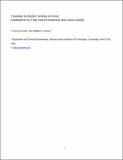Transition to Electric Vehicles in China: Implications for Total Cost of Ownership and Cost to Society
Author(s)
Hsieh, I-Yun Lisa; Green Jr, William H
DownloadHsieh_China's EV TCO_STEEP (accepted).pdf (1007.Kb)
Open Access Policy
Open Access Policy
Creative Commons Attribution-Noncommercial-Share Alike
Terms of use
Metadata
Show full item recordAbstract
China is driving the transition away from internal combustion engine vehicles (ICEVs) to plug-in electric vehicles (PEVs, including plug-in hybrid electric vehicles (PHEVs) and battery electric vehicles (BEVs)) to address its pressing energy security and environmental pollution problems. The recent enactment of the dual-credit scheme mandate will compensate for the phase out of the subsidy program, while ostensibly shifting the burden of filling in the cost gap between PEVs and ICEVs from the government to the automakers (though in practice to car buyers). We estimate that creating an inflection point for PEV demand via the mandate will put substantial transition costs on the society—on average on the order of 100 billion Yuan per year from 2021 to 2030, consuming about 0.1% of China’s growing GDP each year; these transition costs should be compared to societal benefits of PEVs (e.g., enhanced energy security, climate change mitigation, and improved public health) to evaluate the net social value of vehicle electrification. The consumer-centric total cost of ownership (TCO) is investigated using the local data: thanks to the generous subsidies, China’s subsidized PEVs are in TCO parity with counterpart ICEVs from 2016 to 2020. Nevertheless, after subsidies are eliminated at the end of 2020, this TCO parity is unlikely to be achieved for BEVs, if the automakers keep the same price structure as today. The range of TCO ratio of BEV to ICEV for 2030 is: a lower quartile of 1.03; median of 1.07; and upper quartile of 1.10. It is uncertain how the cost gap will be covered when the subsidies are removed. However, automakers are expected to use internal subsidies to lower PEV prices and raise ICEV prices as needed to achieve the mandated percentage of sales.
Date issued
2020-07Department
Massachusetts Institute of Technology. Department of Chemical EngineeringJournal
SAE International Journal of Sustainable Transportation, Energy, Environment, & Policy
Publisher
SAE International
Citation
Hsieh, I. and Green, W., "Transition to Electric Vehicles in China: Implications for Total Cost of Ownership and Cost to Society," SAE International Journal of Sustainable Transportation, Energy, Environment, & Policy 1, 2 (July 2020): 13-01-02-0005.
Version: Author's final manuscript
ISSN
2640-6438